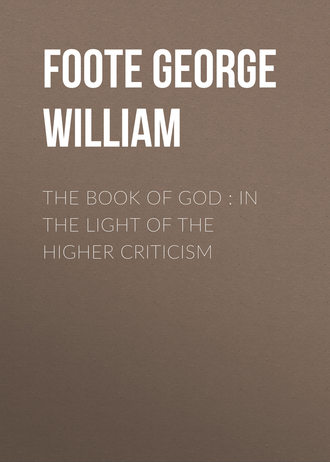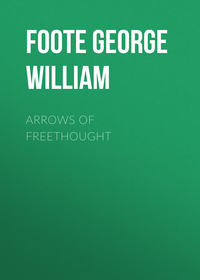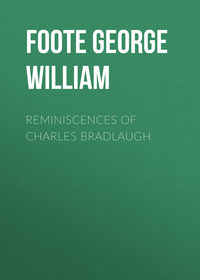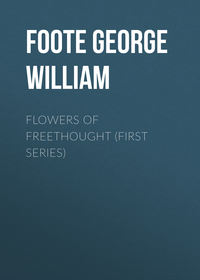 полная версия
полная версияThe Book of God : In the Light of the Higher Criticism
But before we proceed to criticise Dr. Farrar's position, let us glance at his attack upon the literalists. He charges them with having opposed and persecuted every modern science, and with having manufactured the most absurd scientific theories from the text of the Bible; the said theories being not only ludicrous, but irreconcilably opposed to each other. Lactantius, with the Bible in his hand, ridiculed the rotundity of the earth. Roger Bacon and Galileo were imprisoned and tortured for teaching true science instead of the false science of the Church. John Wesley declared the Copernican astronomy to be in opposition to Scripture. Thomas Burnet's "Sacred Theory of the Earth," founded upon the Bible, was assailed by William Whiston, who based a different "Sacred Theory" upon the very same book. Buffon, the great French scientist, was compelled by the Sorbonne to recant, and to abandon everything in his writings that was "contrary to the narrative of Moses." Even when God (that is to say Dr. Simpson) gave to the world the priceless boon of anaesthetics, there were many Biblicists who declared that the use of chloroform in cases of painful confinement was flying in the face of God's curse upon the daughters of Eve. Catholic and Protestant have alike pitted the Bible against Science, and both have been ignominiously beaten.
But this is not all. The theologians have been disgraced as well as defeated. With respect to the Buffon case, for instance, Dr. Farrar writes as follows: —
"The line now taken by apologists is very different from that of previous centuries, and less honest. It declares that Genesis and geology are in exact accord. It no longer refuses to believe the facts of nature, but instead of this it boldly sophisticates the facts of Scripture."
John Stuart Mill said that every new truth passes through three phases of reception. At first, it is declared to be false and dangerous; secondly, it is discovered that there is something to be said for it; lastly, its opponents turn round and declare "we said so all along." Dr. Farrar dots all the "i's" in Mill's statement. He asserts that "religious teachers" first say of every scientific discovery, "It is blasphemous and contrary to Scripture." Next they say, "There is nothing in Scripture which absolutely contradicts it." Finally they say, "It is distinctly revealed in Scripture itself."
Dr. Farrar puts the historic case against "orthodoxy" – which, of course, is not Christianity! – in the following fashion: —
"The history of most modern sciences has been as follows. Its discoverers have been proscribed, anathematised, and, in every possible instance, silenced or persecuted; yet before a generation has passed the champions of a spurious orthodoxy have had to confess that their interpretations were erroneous; and – for the most part without an apology and without a blush – have complacently invented some new line of exposition by which the phrases of Scripture can be squared into semblable accordance with the now acknowledged facts."
Even in the comparatively recent case of Darwin this was perfectly true. Dr. Farrar, who preached Darwin's funeral sermon in Westminster Abbey, says that he "endured the fury of pulpits and Church Congresses." He did so with quiet dignity; not an angry word escaped him. Yet before Darwin's death not only was the scientific world converted, but leading theologians said that, if Darwinism were proved to be true, there was "nothing in it contrary to the creeds of the Catholic faith."
Darwin never answered the clergy. He had better work to do. All he did was to smile at them. In one of his letters he said that when the men of science are agreed about anything all the clergy have to do is to say ditto. He understood that when science is victorious it will always have clerical patronage. Had he been able to do it, he would have smiled, in that beautiful benevolent way of his, at Dr. Farrar's funeral sermon. The worthy Dean thought they had got Darwin at last; and the grand old philosopher might have said, "Why yes, my corpse!"
So much for Dr. Farrar's impeachment of "orthodoxy" and its doctrine of plenary inspiration. Let us now examine his own position, and see whether it is logical as well as convenient.
Take the first chapter of Genesis. It is not a scientific revelation, though it seems to be. Whoever wrote it had only the science of his time. Nevertheless, it is of "transcendent value," according to Dr. Farrar. "Its true and deep object," he says, "was to set right an erring world in the supremely important knowledge that there was one God and Father of us all, the Creator of heaven and earth, a God who saw all things which he has made, and pronounced them to be very good."
This is very pretty in its way; but how absurd it is in the light of the fact that the Hebrew creation story is all borrowed! While the Jews were desert nomads, long before the concoction of their sacred scriptures the doctrine of a Creator of heaven and earth was known in India and in Egypt, not to recite a list of other nations. If this is all the first chapter of Genesis teaches, we may well exclaim, "Thank you for nothing!" It is a curious "revelation" which only discloses what is familiar. Had the Bible never been written, had the Jews never existed, the "true and deep object" of the first chapter of Genesis would have been quite as well subserved. Wherever the Christian missionaries have gone they have found the creation story in front of them. Wherever they took it they were carrying coals to Newcastle.
We venture to suggest that if Dr. Farrar thinks that all things God has made are very good, there are many persons who do not share his opinion. It would be idle to read that text to a sailor pursued by a shark. We could multiply this instance a thousandfold; but why give a list of all the predatory and parasitical creatures on this planet, from human tyrants and despoilers down to cholera microbes? Dr. Farrar may reply that everything ends in mystery, that we must have faith, that it is our interest as well as our duty to believe. But that is exactly what the Catholic Church says, and Dr. Farrar laughs it to scorn. The truth is, that all theology is ultimately a matter of faith; and the quarrel about more or less is a domestic difference. The greater difference is between Faith and Reason. This was clearly seen by Cardinal Newman, who pointed out that every mystery of the Roman Catholic faith is matched by a mystery in Protestant theology.
Finally, we have to remark that Dr. Farrar overlooks a very important point in this controversy. Having argued that the Bible was not intended to teach science, and has not in fact helped the world to a single scientific discovery; having also admitted that the Bible has all along been used to hinder the progress of natural knowledge, and to justify the persecution of honest investigators; he seems to imagine that there is no more to be said. But there is much more to be said. We forbear to press the objection that Omniscience was very curiously employed in entangling a religious revelation with scientific blunders, which would necessarily retard the progress of scientific truth, and therefore of human civilisation. What we wish to emphasise is less open to the retort that Omniscience is beyond our finite judgment. We desire to urge that the Bible is not simply non-scientific. It is anti-scientific. Let us take, for instance, the story of the creation and fall of man. Even if it be not taken literally, but allegorically, it is thoroughly antagonistic to the teachings of Evolution. At the very least it implies that man is something special and unique, whereas he is included in the general scheme of biology, and is but "the paragon of animals." Get rid of the actual garden and the actual tree of knowledge, as Dr. Farrar does, and there still remains the fact that the fall of man is a falsehood, and the ascent of man a verity. The allegory does not correspond to the essential truth of man's history; and in spite of all the flattering rhetoric with which Dr. Farrar invests it – a rhetoric so inharmonious with its own consummate simplicity – there is something inexpressibly childish to the modern mind in the awful heinousness which is attributed to the mere eating of forbidden fruit. An act is really not vicious because it is prohibited, or virtuous because it conforms to the dictates of authority. When man attains to intellectual maturity he smiles at the ethical trick which was played upon his youthful ignorance. It is not sufficient to tell him that he must do this, and must not do that. He requires a reason. His intelligence must go hand in hand with his emotions. It is this union, indeed, which constitutes what we call conscience.
The truth is that the Bible is steeped in superstition and supernaturalism. Its cosmogony, its conception of man's origin and position in the universe, its infantile legends, its miracles and magic, its theory of madness and disease, its doctrine of the external efficacy of prayer, its idea that man's words and wishes avail to change the sweep of universal forces and the operation of their immutable laws: all this is in direct opposition to the letter and spirit of Science. The special pleading of clergymen like Dr. Farrar may afford a temporary relief to trembling Christians, and keep them for a further term in the fold of faith; but it will never make the slightest impression upon sceptics, unless it fills them with contemptuous pity for a number of clever men who are obliged, for personal reasons, to practise the lowest arts of sophistry.
IV. MIRACLES AND WITCHCRAFT
Dr. Farrar, as we have seen, holds that the Bible is not a revelation in science. The inspired writers were, in such matters, left to their natural knowledge. The Holy Spirit taught them that God made the world and all which it inhabits; but how it was made they only conjectured. The truth, in this respect, was left to the discovery of later ages.
This is a pretty and convenient theory, but it does not provide for every difficulty in the relationship between science and the Bible. There still remain the questions of miracles and witchcraft.
Dr. Farrar does not discuss these questions thoroughly. He only ventures a few observations. In his opinion, the two miracles of the Creation and the Incarnation "include the credibility of all other miracles." We agree with him. Admit creation out of nothing, and you need not be astonished at the transformation of water into wine. Admit the birth of a boy from a virgin mother, and you need not raise physiological objections to the story of a man being safely entertained for three days in a whale's intestines. It is absurd to strain at gnats after swallowing camels. For this reason we are unable to understand Dr. Farrar's fastidiousness. He is ready to believe that some miracles are mistaken metaphors, that some were due to the action of unnoticed or ill-understood natural causes, and that others were providential occurrences instead of supernatural events. All this, however, is but a concession to the sceptical spirit. It is throwing out the children to the wolves. It may stop their pursuit for a little while, but they will come on again, and flesh their jaws upon the parents.
A mixed criterion of true miracles is laid down by Dr. Farrar. They must be (1) adequately attested, and (2) wrought for adequate ends, and (3) in accordance with the revealed laws of God's immediate dealings with man. The second and third conditions are too fanciful for discussion. They are, in fact, entirely subjective. The first condition is the only one which can be applied with decisive accuracy. The miracles must be adequately attested. But was it not David Hume who declared that "in all history" there is not a single miracle attested in this manner? And did not Professor Huxley say that Hume's assertion was "least likely" to be challenged by those who are used to weighing evidence and giving their decision with a due sense of moral responsibility?
It is easy enough to sneer at Hume. It is just as easy to answer what he never said. What the apologists of Christianity have to do is to take a single miracle of their faith and show that it rests upon adequate evidence. Anything short of this is intellectual thimble-rigging.
Dr. Farrar does not face this dreadful task. He treats us, instead, to some personal observations on the Fall, the Tower of Babel, Balaam's ass, Joshua's arrest of the sun and moon, and Jonah's submarine excursion. Let us examine these observations.
No Christian, says Dr. Farrar, is called upon to believe in an actual Garden of Eden and an actual talking serpent. Christians have believed in these things by the million. But that was before the clergy invented "the Higher Criticism" to disarm "infidelity." They know better now. The story of the Fall is false as a narrative. It is true as a "vivid pictorial representation of the origin and growth of sin in the human heart." All the literature of the world has failed to set forth anything "comparable to it in insight." Therefore it is "inspired."
How hollow this sounds when we recollect that the Hebrew story of the Fall was borrowed from the Persian mythology! How much hollower when we consider it as it stands, stripped of the veil of fancy and divested of the glamor of association! The "insight" of the inspired writer could only represent God as the landlord of an orchard, and man as a being with a taste for forbidden apples. The "philosopheme," as Dr. Farrar grandiosely styles it, is so absurd in its native nakedness that Rabbis and other divines have suspected a carnal mystery behind the apples, in order to give the "sin" of Adam and Eve a darker vein of sensuality.4
Nor is this all. The very idea of a Fall is inconsistent with Evolution. The true Garden of Eden lies not behind us, but before us. The true Paradise is not the earth as God made it for man, but the earth as man is making it for himself. The Bible teaches the descent of man. Science teaches the ascent of man. And the two theories are the antipodes of each other, not only in physical history, but in every moral and spiritual implication.
With regard to the story of the tower of Babel, we must not regard it as an inspired account of the origin of the diversity of human language. That is what it appears to be upon the face of it. But philology has exploded this childish legend, and a new meaning must be read into it. According to Dr. Farrar, it is a "symbolic way of expressing the truth that God breaks up into separate nationalities the tyrannous organisation of cruel despotisms." Now we venture to say that there is not a suggestion of this in the text. And the "truth" which Dr. Farrar reads into it so arbitrarily is a phenomenon of modern times. Nationality is a great force at present, but in ancient days the only power that could bind tribes together in one polity was a military despotism. From the point of view of evolution, both conquest and slavery were inevitable steps in the progress of civilisation. It is really nothing against the ancient Jews, for instance, that they fought like devils and made slaves of their enemies. It was the fashion of the time. The mischief comes in when we are told that their proceedings were under the sanction and control of God.
Dr. Farrar next tackles the story of Balaam, which is "another theme for ignorant ridicule." It is astonishing how sublime these Bible wonders become in the light of the Higher Criticism. A talking ass sounds like an echo of the Arabian Nights. But the author himself never intended you to believe it. Dr. Farrar is quite sure of that. You must forget the ass, and fix your attention on Balaam. Then you perceive that the story is "rich in almost unrivalled elements of moral edification." That is to say, you perceive it if you borrow Dr. Farrar's spectacles. But if you look with your own naked eyes you see that ass in the foreground of the picture, with outstretched neck and open jaws, holding forth to an astonished universe.
With regard to Joshua's supreme miracle, Dr. Farrar avows his unbelief. A battle ode got mistaken for actual history. "He who chooses," says Dr. Farrar, "may believe that the most fundamental laws of the universe were arrested to enable Joshua to slaughter a few more hundred fugitives; and he who chooses may believe that nothing of the kind ever entered into the mind of the narrator." You pay your money and take your choice. Shape the old wax nose as you please. Believe what you like, and disbelieve what you like – and swear the author disbelieved it too.
Nor must the story of Jonah be taken literally. Regard the moral, and forget its fishy setting. Jesus Christ, indeed, referred to Jonah's sojourn in the "whale's belly" as typical of his own sojourn in the heart of the earth. But referring to a story is no proof of any belief in its truth. Not in the Bible. Jesus Christ also said, "Remember Lot's wife." But of course he did not believe the story literally. He used it for his own purpose. For the rest, he did not wish to unsettle men's minds by throwing doubt on such a time-honored narrative; besides, the time had not arrived to explain the chemical composition of rock-salt.
Witchcraft is a more serious matter. The Bible plainly says, "Thou shalt not suffer a witch to live." This text sealed the doom of millions of old women. It is the bloodiest text in all literature. The Jews believed in witchcraft, and the law against witches found its way into their sacred Scriptures. Sir Matthew Hale, a great English judge and a good man, sentenced witches to be burnt in 1665, and said that he made no doubt at all that there were witches, for "the Scriptures had affirmed so much." Wesley, a century later, said that to give up witchcraft was to give up the Bible. Dr. Farrar sets down these facts honestly. He is also eloquent in reprobation of the cruelty inflicted on millions of "witches" in the Middle Ages. But he denies that the Bible is responsible for those infamies. "Witches" in the Bible may not mean witches, but "nefarious impostors." Good old wax nose again! Moreover, that ancient Jewish law was not binding upon Christians, and to make it so was "a gross misuse of the Bible." But how on earth could the Christians use it in any other way? The time came when men outgrew the superstition of witchcraft. Before that time they killed witches on Bible authority. Dr. Farrar himself, had he lived then, would have done the same. Living in a more enlightened age, he says that former Christians acted wrongly, and in fact diabolically. But what of the book which misled them? What of the book which, if it did not mislead them by design, harmonised so completely with their ignorant prejudices, and gave such a pious color to their unspeakable brutalities? Nor is this by any means the last word upon the subject. The witchcraft of the Old Testament has its counterpart in the demoniacal possession of the New Testament. Both are aspects of one and the same superstition.
The Bible is responsible for the cruel slaughter of millions of alleged witches. It is also responsible for the prolonged treatment of lunatics as possessed. The methods of science are now adopted in civilised countries. Hysterical women are no longer tortured as witches. Lunatics are no longer chained and beaten as persons inhabited by devils. Kindness and common sense have taken the place of cruelty and superstition. This change was brought about, not through the Bible, but in spite of it.
Sir Matthew Hale and John Wesley were at least honest. They were too sincere to deny the plain teaching of the Bible. Dr. Farrar represents a more enlightened, but a more hypocritical, form of Christianity. He sneers at "reconcilers" like Mr. Gladstone, who try to bolster up the Creation story as a scientific revelation. But is he not a "reconciler" himself in regard to miracles? And does he not play fast and loose with truth and honesty in his attempt to clear the Bible of its guilty responsibility in connection with that witch mania which is one of the darkest episodes in Christian history?
V. THE BIBLE AND FREETHOUGHT
The Bible may well be called the persecutor's text-book. It is difficult, if not impossible, to find in all its pages a single text in favor of real freedom of thought. Dr. Farrar champions what he calls "true Christianity," to which he declares that all persecution is entirely "alien." This "true Christianity" appears to depend upon "the spirit" of Christ, and seems to have little or no relation to the letter of Scripture. But what is the actual fact, when we view it in the light of history? In one of his lucid intervals of mere common sense, Dr. Farrar makes an important admission with regard to the worse than Armenian atrocities of the Jewish policy of extermination in Palestine. Those atrocities of cruelty and lust are said to have been ordered by God, but Dr. Farrar says that on this point the Jews were mistaken. They thought they were doing God a service, but they thought so ignorantly. And how was their ignorance corrected? Not by a special monition from heaven, but by the ordinary progress and elevation of the human mind. "It required," Dr. Farrar says, "but the softening influence of time and civilisation to obliterate in the best minds those fierce misconceptions." Precisely so. And is it anything but the softening influence of time and civilisation that makes Christians like Dr. Farrar ashamed of the bloody deeds of their co-religionists; which bloody deeds, by the way, have always been justified by appeals to the teachings of the Bible? Let there be no mistake on this point. Dr. Farrar himself does not scruple to write of the "deep damnation of deeds of deceit and sanguinary ferocity committed in the name of Holy Writ." "In some of their deadliest sins against the human race," he further says, "corrupted and cruel Churches have ever been most lavish in their appeals to Scripture." He admits that "the days are not far distant when it was regarded as a positive duty to put men to death for their religious opinions," and that this was defended by Old Testament examples, and also by some texts from the New Testament. And it was "by virtue of texts like these" that enemies of the human race were "enabled" to combine the "garb and language of priests with the temper and trade of executioners."
Now, what has Dr. Farrar to urge per contra? Simply this: that the "early Christians" pleaded for toleration. "Force," they said, "is hateful to God." "It is no part of religion," said Tertullian, "to compel religion." But suppose all this be admitted – and there is much to be said by way of qualification – what does it amount to? The "early Christians" were in a minority. They did not yet command the sword of the magistrate. They could not persecute except by holding no fellowship with unbelievers, by shaking off the dust of their feet against those who rejected their Gospel, and by other harmless though detestable exhibitions of bigotry. They had to plead for their own existence, and in doing so they were obliged to appeal to the principle of general toleration. But the moment they triumphed, under Constantine, they began to flout the very principle to which they had formerly appealed. The humility of their weakness was more than equalled by the pride of their power. And what was the result? "From Augustine's days down to those of Luther," Dr. Farrar says, "scarcely one voice was raised in favor, I will not say of tolerance, but even of abstaining from fire and bloodshed in support of enforced uniformity." Dr. Farrar denounces in creditable language the frightful butcheries of Alva in the Netherlands, for which the Pope presented him with a jewelled sword bearing a pious inscription. He is properly horrified at the massacre of St. Bartholomew, in honor of which Pope Gregory XIII. struck a triumphant medal, and went in procession to sing a Te Deum to God, while the cannon thundered from the Castle of St. Angelo and bonfires blazed in the streets of Rome. He is bitter against the Church of Rome for its vast shedding of innocent blood. He reminds us that the infamous Holy Inquisition is still toasted by Catholic professors at Madrid; and that intolerance, having lost its power, has not lost its virulence, nor "ceased to justify its burning hatred by Scripture quotations." And he cites Manning's successor at Westminster, the truculent Cardinal Vaughan, as declaring with perfect approval that "the Catholic Church has never spared the knife, when necessary, to cut off rebels against her faith and authority."









